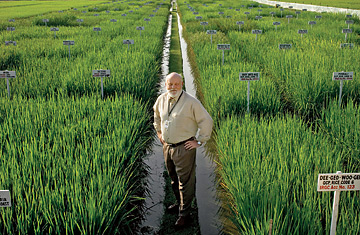
A portrait of Robert Zeigler, an American plant pathologist who has headed the IRRI (Philippines-based International Rice Research Institute) since 2005.
Robert Zeigler knows that the skyscrapers of Asian megacities like Shanghai, Mumbai (formerly Bombay) and Bangkok grow from grains of rice — at least in a sense. Thanks in large part to the work of the Philippines-based International Rice Research Institute (IRRI), which developed strains in the 1960s that vastly multiplied rice harvests, Asia was able to free up resources for the rapid economic development seen today.
But the Green Revolution is cooling. Rice yields are growing less than 1% annually, global stocks of the grain are at their lowest levels in 30 years, and rising temperatures could one day render paddies barren. "We thought we'd solved the problem of poverty and hunger in Asia," says Zeigler, 56, an American plant pathologist who has headed the IRRI since 2005. "That's clearly not the case."
As population continues to grow in the rice-dependent parts of the world — principally Asia, Africa and South America — what's needed is nothing less than a second Green Revolution, and Zeigler is making it happen.
Under his leadership, the IRRI has redoubled efforts to breed strains of rice that can survive both drought and flooding, preparing for a future in which there may simultaneously be too little and too much water. One strain being developed can even grow on dry land. That would benefit farmers today who remain mired in poverty because their fields are too hot and dryand could become hotter and drier still. Zeigler believes that by tackling stagnating rice yields, the institute can help tackle global poverty too. "Rice that is ready for a tougher climate tomorrow will also help us deal with the problems of the poor today," he says.
Most ambitious — and potentially game-changing — is a program to produce rice that can photosynthesize more efficiently — allowing it to grow more robustly — using four carbon atoms rather than three. It's called C4 rice, and one possible technique for producing it could involve genetically modifying the plant by transplanting genes from a C4 crop like corn. GM plants are still controversial, but Zeigler believes we have no choice. "It can make the difference between life and death" — as the IRRI already does.